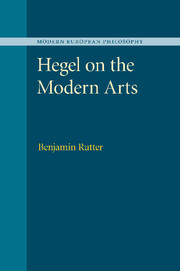1 - The problem of a modern art
Published online by Cambridge University Press: 06 December 2010
Summary
That Hegel bears witness in his lectures on aesthetics not to a cessation of artistic activity but to a decline in its significance for human self-understanding is quite certain. Less evident is the extent and nature of this decline. The debate over the proper interpretation of the “end of art,” in other words, centers not on the likelihood that plays and paintings will cease to be produced (or even, in some narrow sense, enjoyed) but on the possibility that their production will largely cease to matter to their intended audience, the cultivated European publics of the nineteenth century. Interested non-specialists have often subscribed to this pessimistic view. Scholars of the Aesthetics, meanwhile, have long divided on the issue, some defending the pessimistic account, others retrieving from the half-dozen editions and several thousand pages of the lectures the sense of some enduring role for art. If the idea that art has no real place in Hegel's mature system is still defended, the balance of opinion has shifted in the past decade in favor of a more optimistic appraisal. More than one commentator has recently asserted the ongoing indispensability of the arts on a properly Hegelian conception of the modern world, and the prospect of some rough convergence of opinion on such an old question is encouraging.
- Type
- Chapter
- Information
- Hegel on the Modern Arts , pp. 6 - 62Publisher: Cambridge University PressPrint publication year: 2010

